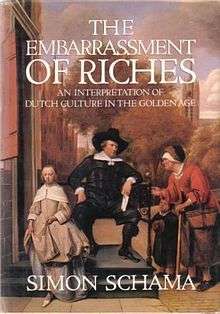The Embarrassment of Riches
The Embarrassment of Riches: an interpretation of Dutch culture in the Golden Age is a book by the historian Simon Schama. It was published in 1987. The book sold quite well and led to an immediate second printing only a few months after its release.
 Cover of the first edition | |
| Author | Simon Schama |
|---|---|
| Cover artist | Jan Steen |
| Language | English |
| Subject | Dutch Golden Age |
| Publisher | Alfred A. Knopf |
Publication date | 1987 |
| Media type | Print (hardcover) |
| Pages | 698 |
| ISBN | 0-394-51075-5 |
Summary
In his attempt to make a systematic overview of the Dutch Golden Age culture, Schama cites an eclectic list of period source materials from all over the world, including emblem books, period histories and novels, cookbooks, scientific discoveries, bankruptcy files, religious works, and period art including prints, paintings, sculpture, architecture and stained glass windows. Schama revisits Dutch Golden Age morals, from how they brought up their children, to how they mourned their dead.
Historiography
The history of the Netherlands has long been colored by local histories financed by various institutions and leading families through the ages. There are several discrepancies to be found in period accounts between the various city archives, and the archives of other institutions such as water boards or the Bishopric of Utrecht.
Many archives have been sadly neglected or worse, destroyed by war or as in the case of the Catholic Church, the beeldenstorm. Authors through the centuries have often used materials from predecessors without questioning the original sources, leading to many conflicting statements.
Criticism
Susan Buck-Morss criticizes Schama for his "selective national history" of the Dutch Republic, "that omits much or all of the colonizing story."[1] "One would have no idea that Dutch hegemony in the slave trade—replacing Spain and Portugal as major players—contributed substantially to the enormous overload of wealth that he describes as becoming so socially and morally problematic during the century of Dutch centrality to the "commerce of the world."[1]
Herman Pleij, a Dutch professor of Medieval Dutch literature was inspired to write a whole book in response, called The Dutch Embarrassment.[2]
Footnotes
- Buck-Morss 2000, pp. 821–865.
- Pleij 1991.
Bibliography
- Buck-Morss, S. (2000). "Hegel and Haiti". Crit. Inq. University of Chicago Press. 26 (4): 821–865. JSTOR 1344332.CS1 maint: ref=harv (link)
- Pleij, H. (1991). Het Nederlandse Onbehagen (in Dutch). Amsterdam: Prometheus. ISBN 90-5333-068-2.